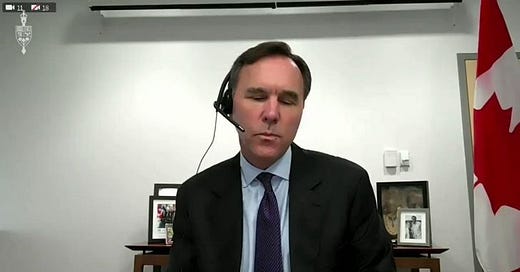The Forgetful Bill Morneau
Misplacing the money
It seems that Canada’s Minister of Finance has a case of memory loss and forgetfulness.
And it’s about something that’s usually top of mind for most of the rest of us: money.
Morneau offered some shocking testimony before the House of Commons Finance committee yesterday, describing a $41,000 cheque he hastily wrote to the WE Charity to reimburse them for two foreign trips they comped him and his family in 2017.
Morneau is already under fire for not recusing himself from the cabinet decision to grant WE $912 million in COVID-19 related relief initiatives, ostensibly aimed at bolstering student volunteerism. Morneau’s daughter works for the charity. Both the Prime Minister and Morneau have admitted their fault over the conflicts.
Of course, this isn’t the first time that Morneau has been forgetful about his personal financial interests. The minister — who is now overseeing more than a $343 billion budgetary deficit — seems to be keeping his receipts, investment statements, and property deeds in a shoebox, if at all.
Morneau famously forgot to disclose to the Parlimentary Ethics Commissioner that he owned a villa in France.
Morneau also forgot about his day job as Finance Minister when he sold $10 million worth of stock in his family’s pension services company a week before he tabled legislation that affected the pension industry.
Morneau’s previous committee appearences and ability to recall information have made for great sport for his opposition critic, Pierre Poilievre.
Will Morneau Resign?
Certainly, the spectre of conflict of interest and the failure to recuse oneself from cabinet decisions does not bode well for any Minister in any Westminter democracy who finds themselves similarly embroiled.
But Morneau can take solace in light of his boss running afoul of the exact same rules. Justin Trudeau failed to separate himself from decisions affecting WE even though his family was on the charity’s payroll for public speaking.
Yet if Trudeau feels that a sacrifice could turn the issue for him, Morneau could find himself having become more useful as the fall guy.
Meanwhile, Conservative recollection of parallel events is in full swing.
Other WE developments
Two other committee witnesses, Jesse Brown and Vivian Krause, also appeared and shaped a critical view of WE. Brown alleged that former employees of WE likened it to a cult, whereas Krause raised questions about WE and the Liberal Party of engaging in data-sharing agreements. WE denies the suggestion.
Brief interruption, newsletter continues below!
Should more people read about this? Share this newsletter. Thanks!
GPT-3 and the future of politics
The artificial intelligence community is heralding a breakthrough.
OpenAI, a San Francisco-based artificial intelligence company, has trained a new algorithm with text from the internet (~2TB worth) to allow users to enter simple input to generate complex and surprisingly passable output.
The company released its functionality as a beta to the public last week.
Programmers are using GPT-3 to describe applications that they want to build and are getting source code as output. Designers are using the OpenAI offering to describe layouts that they want to create and the algorithm delivers styling markup.
Companies are working toward using the algorithm to write lengthy response emails in a user’s own voice based on a few bullet points.
Someone even wrote a program to translate legalese into plain english.
As with most things AI, critics say that it will replace workers and jobs while advocates point out that it will free people to do more meaningful work.
But let’s consider the political and related societal implications, both good and bad.
On the one hand, GPT-3 will make the generation of ‘fake news’ articles and phishing emails much easier for those with bad intentions to deceive voters. This would be done in order to game advertisers or even national elections.
Alternatively, this technology could lower the barrier for people to provide meaningful dialog for the political process. Today, to express their own views, many share political cartoons, articles written by national columnists, or highly degraded Minions™ GIFs.
As media faces both funding and representation crises, the breadth of selection can leave many wanting, evidenced by growing complaints of media elitism and lack of ideological and experiential diversity. Tomorrow, AI-assisted content generation could help give a voice to anyone with a lot to say but who lacks the time or skill to express it.
Do you like interesting political and technology content? Did someone forward this to you or share it with you on social media?





